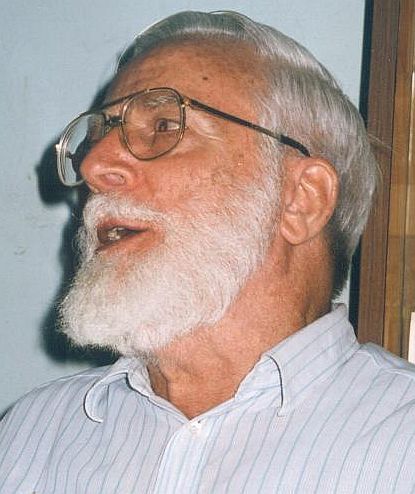Daniel Comboni
Comboni Missionaries
Institutional area
Other links
Newsletter
In Pace Christi
Pilati Tarcisio
Fr. Tarcisio was born on 10 January, 1925, in the tiny village of Pressano, in the commune of Lavis and the Province of Trent. In 1941 he joined the minor seminary in Trent. In 1944 he went on to the novitiate in Venegono where, after another two years, he took his first vows. He was ordained priest in Milan on 7 June, 1952. The following September, he left for Khartoum and began teaching in the Technical School in October. When he arrived, Fr. B. Agostino Galli, seeing that he knew neither English nor Arabic, gave him a dictionary and said: “Do the best you can”. Fr. Tarcisio learned both languages all by himself and reached a good level of proficiency.
He spent his first Sudanese period, up to 1966, first at “St. Joseph’s Technical School”, and then at the communities of El Nahud, Port Sudan and Atbara, always teaching English. As we know, the schools were the main activity in North Sudan (Khartoum) while the pastoral work only began in earnest in the early eighties, after the influx en masse of the people fleeing the war in the South.
In 1966 Fr. Tarcisio was assigned to Uganda also with a view to allowing him to have some pastoral experience in direct contact with the people. He stayed there for six years as curate in the missions of Ngeta, Aboke and Minakulu, all of which belonged to the diocese of Lira. In Uganda he was able to meet his brother, Fr. Germano, who was also a Comboni Missionary.
Now almost fifty years old and after twenty years in Africa, he felt he needed some time for reflection and asked to spend a year outside the Comboni community. He soon understood that he belonged in the mission and asked to return. In 1974 he was again sent to Sudan where he spent the rest of his life.
Comboni College was the mission Fr. Tarcisio loved most: he taught there without a break for twenty years, up to 1996. However, in later years he had the opportunity to teach English and Arabic to the Comboni seminarians and postulants before being transferred for the second time to Port Sudan, then to Khartoum Bahri and, lastly, to El-Obeid, where he worked as much as his strength allowed, in minor pastoral services. Up to the last month of his life – he was already 88 years of age – he was happy to celebrate Mass for the Sisters of Mother Teresa on weekdays and, on Sundays, for the prisoners. He had some experience in this field as, during his final years at Khartoum, he used to go every Sunday to visit the large prison of Kober to say Mass and hear confessions.
Fr. Tarcisio was a very strong and complex personality. Despite his radical views, those close to him found he was most capable of self-criticism and of changing his opinion when he needed to. Notwithstanding his differences with some confreres, as soon as he realised he was mistaken or had treated others unjustly, he soon asked their pardon. In daily life, he was very regular and punctual; his day was organised and was divided into times for prayer, work and reading.
He lived an austere life, even too much so. On one occasion, in Port Sudan, the Eritrean refugees, grateful for the Mass he celebrated for them every Friday, seeing the worn-out clothes he was wearing, took up a collection to buy him some new ones. Fr. Tarcisio did not want to accept them but his confreres told him the refugees might be offended if he refused. He let himself be persuaded and agreed to accept the new clothes. However, he only wore them when going to say Mass for the refugees. He never owned a watch or even a camera, a cell phone or a computer. He never once complained of the food or the lack of amenities. He never wanted to travel or to take holidays which he called “tourist trips”.
Other excesses were evident in the intellectual and spiritual fields. Having read the Koran – both in Italian and in English – he questioned those confreres who had spent all their lives among the Moslems without knowing that text. He had also collected the most important verses of the Koran in a booklet as if to discover the answer to the question: how can Moslems live in peace with non-Moslems?
He followed international events and was always well informed of the latest Sudan news, anxious to see the arrival of a new era and convinced that modern times would bring a solution to his questions.
It was his ardent desire to stay in Sudan until his death and God granted him this grace. Two weeks before he died, he was suddenly taken from El Obeid to the hospital in Khartoum where it was found that he had a very advanced cancer of the liver. During his last days, he showed immense gratitude to the Comboni confreres and to the Comboni Sisters who took care of him at Villa Gilda. He died most peacefully on the morning of 26 October, 2013, around eight o’clock.
(Fr. Angelo Giorgetti, mccj).
Da Mccj Bulletin n. 258 suppl. In Memoriam, gennaio 2014, pp. 113-118.

